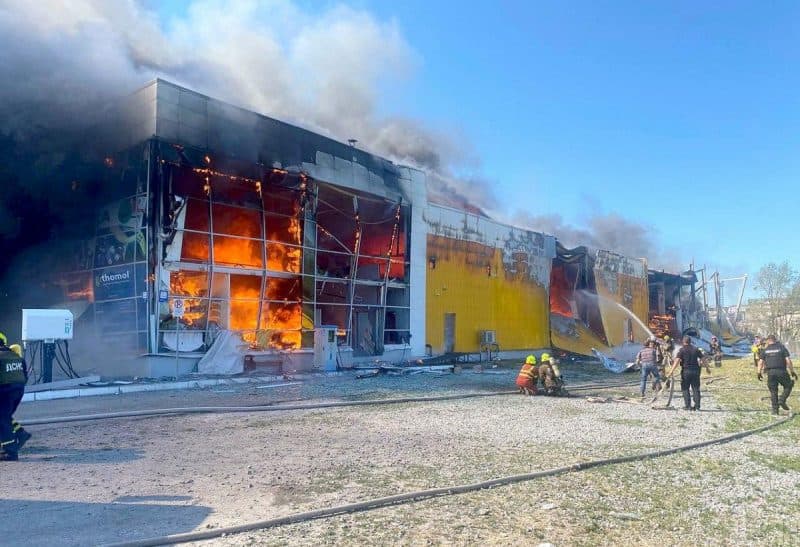As Russia’s war continues, Ukrainian businesses struggle to compensate damages

In its brutal war of conquest in Ukraine, Russia has been destroying everything in its path since its full-scale invasion began on Feb. 24.
In addition to the immense human toll Russia’s war has taken on Ukraine, the country’s businesses – from small сozy cafes, cinemas, and supermarkets to large metallurgical plants and agricultural corporations – have suffered greatly from the full-scale invasion.
According to the National Bank of Ukraine, direct losses of enterprises, housing, and infrastructure reached $100 billion since Russia invaded in February. This is equivalent to 50% of the country's gross domestic product in 2021.
Physical damage to businesses is at an estimated $8.8 billion, according to the Kyiv School of Economics (KSE). In five months of Russia’s war, the Russian military has damaged, destroyed, or seized more than 380 enterprises, 23 shopping centers, nearly 44,000 pieces of agricultural equipment, and 28 oil depots, KSE says.
Some one-tenth, or 2,910, of the country’s retail stores with a total area of 1.6 million square meters were bombed or shelled by late April, the Association of Retailers of Ukraine reported.
Taking into account total economic losses, businesses and heavy industry have suffered the most out of any sector of Ukraine’s economy with $29.8 billion in losses, according to KSE’s findings.
There are virtually no legal mechanisms available, internationally or domestically in Ukraine, to recover business damages caused by the war. Companies can report damages, but with a lack of proper legislation to handle all these claims, businesses may wait years before they see any compensation, if any at all.
“We are here like blind kittens because the next step is unclear,” Olga Balytska, a member of the Supervisory Board at the Center for Economic Strategy, told the Kyiv Independent. “Businesses have been left alone with their problems.”
Read more: Russia’s war may halve Ukraine's economy, increasing budget deficit by billions
A bill approved in its first reading in Ukraine’s Verkhovna Rada only focuses on compensation for destroyed personal property of citizens, not businesses.
Numerous amendments have already been filed to the draft law, including some that would use leftover funds from the restoration of housing and critical infrastructure to compensate for business losses.
Balytska says some large companies may consider defending their own interests in international arbitration courts, but for small to medium-sized businesses that is hardly an option.
International arbitration “can cost not just tens but even hundreds of thousands U.S. dollars, according to Balytska. “It’s exorbitant” for many businesses.
No plan for action
Even though there is no roadmap based on international law, experts seem to agree that sooner or later Russia will have to pay reparations to Ukraine, including compensation to companies.
Which is why, they say, it is crucial Ukrainian businesses report damages to state authorities in any way available, in the event Russia is one day forced to pay for the damage it has caused.
Ukrainian businesses can call the State Emergency Service directly or register the damages through Diia, a mobile app for public services in Ukraine with details about the damage or any remaining materials that may have been left behind.
However, there are currently no legal norms in Ukraine that indicate what information sufficiently documents damage.
As businesses wait for changes in the legislation, Balytska believes they may soon run out of patience because of a lack of clarity on how to proceed.
Gennadiy Chizhikov, head of the Ukrainian Chamber of Commerce, says he’s snowed in with work helping companies survive the war. Two requests – how to report on damages and how to get compensation in the future – are the most common.
He says that while there is no mechanism from the state on how to deal with such situations, a presidential order in mid-May announced the creation of a 20-member expert group that will deal with compensations.
But after two months, Chizhikov has seen no solution from the group.
“Will it be a single register where companies will wait in line (for compensation), or will each company find its own way and take the case to court?” he said. “This is a huge question.”
Long road ahead
Russia’s massive aggression against Ukraine has left the entire legal world at a loss of what to do.
“Today’s international and national legal instruments are either ineffective or non-functional,” said Deputy Justice Minister Iryna Mudra.
Even after the destruction of the Balkans caused by the Yugoslav wars in the 1990s, no proper mechanism was put in place.
“Many people died, but there wasn’t the same scale of destruction (to infrastructure) as we have in Ukraine,” Chizhikov said. “Today’s situation is unprecedented.”
In the rare case of Iraq, it took 31 years for the country, along with the work of a U.N. Compensation Commission, to pay off $52.4 billion in compensations to individuals, companies, and governments as a result of its invasion of Kuwait in 1990.
Since 2014, when Russia invaded Donbas and illegally annexed Crimea, there have been no cases of business losses or damages covered by Russia after court verdicts that ruled in favor of Ukrainian businesses.
Chizhikov hasn’t heard of any successful cases, at least. But he says that many business losses in Ukraine’s eastern Donbas region occupied since 2014 were due to illegal seizure instead of destruction, the current scale of which is incomparable to what was seized.
There is a massive debate about which international organization will be able to handle such these types of cases when the war ends, according to Balytska.
Even if Ukrainian companies report damages and other losses properly, there is no clear understanding of who will receive Russia’s reparations and in what order.
The line to get compensation from Russia is long. According to Chizhikov, there’s Ukraine as a victim country, the countries that helped us, and, for instance, Russian tycoon-turned-dissident Mikhail Khodorkovsky who won a court battle in The Hague for $50 billion in compensation.
Both Balytska and Chizhikov said some international law firms, mostly British and American, have expressed interest in helping large Ukraine companies receive compensation through international arbitration.
These firms are “in a hurry now, because there may not be a lot of reparations, and there will be more people waiting to receive funds than what is actually available,” Chizhikov said.
Read also: Ukraine's resilient tech industry doing well in spite of war









